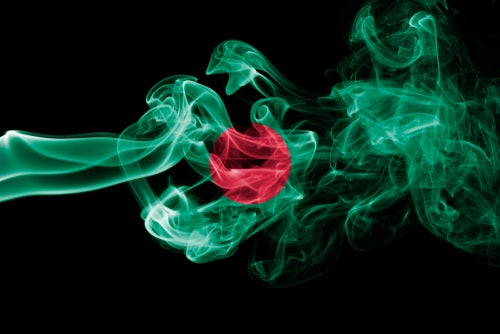
The depot fire took place at a storage depot near the city of Chittagong on 4 June, which was reported to have chemicals stored in some of its containers alongside garments for export.
Bangladesh depot fire highlights the importance of transparency
Professor Muhammad Azizul Islam of The University of Aberdeen’s Business School, who has conducted research on apparel workers in Bangladesh, tells Just Style: “It is terrible to see how garments produced for global brands and various hazardous chemicals were put in the same depot resulting in another industrial disaster.”
He adds the incident must act as a reminder of the importance of both traceability and transparency in terms of not only how garments are produced but also how they are stored in a container before shipment, and how even they are shipped to the endpoint in the Global North.
Care should be taken in particular to ensure goods are not stored in unsafe areas where there is a high-level fire and safety risk.
“Retailers’ compliance audit must address safe storage and shipment in addition to the common issues in production areas,” he adds.
Islam also warns of the dangers of attempting to “cut costs at every part of their supply chain,” adding “while this behaviour leads to perpetuating exploitations, it sometimes, also leads to disaster and human suffering.”

US Tariffs are shifting - will you react or anticipate?
Don’t let policy changes catch you off guard. Stay proactive with real-time data and expert analysis.
By GlobalDataA report published by Reuters said chemical-filled containers were still exploding yesterday (5 June) with firefighters trying to put out the blaze which had already injured more than 200 people.
The International Labor Organization (ILO) said in a statement there needs to be a review of regulations and enforcement in the transport and logistics sector, the payment of adequate compensation and income support to injured and disabled workers, and families of workers who lost lives in work-related accidents, and to conduct safety campaigns that target transport/logistic service providers as well as emergency-service personnel.
It said: “Recently the government, employer and worker representatives have agreed to roll out a modern, comprehensive Employment Injury Scheme (EIS) in Bangladesh starting from the ready-made garment (RMG) sector, with the possibility of extension to other sectors. Such a system includes accident prevention, immediate and long-term compensation, and rehabilitation to return to work.”
The ILO explained it continues to work closely with the Government of Bangladesh, employers’ and workers’ organisations and development partners to improve working conditions in all industries expanding learning from the ready-made garment RMG industry since the Rana Plaza tragedy in April 2013.
“Proper monitoring of industries by government to ensure that industrial and accidental risks are properly understood, addressed and prevented is essential to improving safe working conditions in Bangladesh.
“ILO and the broader UN system in Bangladesh hopes that this tragic accident will drive all parties involved to apply renewed vigour in addressing the safety deficits in workplaces across the country and we extend our assistance to continue to build safer Bangladesh for all.”
The financial cost for the apparel industry
Rakibul Alam Chowdhury, vice president of the Bangladesh Garment Manufacturers and Exporters Association (BGMEA), told local publication The Business Standard he is “certain” apparel products made by eight industrial groups, worth US$18m were damaged in the fire, though the BGMEA did not respond to request for comment when approached by Just Style.
The report claims one company, Santex Knitwears Ltd, a garment factory in Chattogram, sent 29,000 pieces of jackets to the depot for export, which was valued at $3,50,000. Santex did not return a request for comment when approached by Just Style.
None of the other brands named in the reports returned a request for comment when approached by Just Style.



